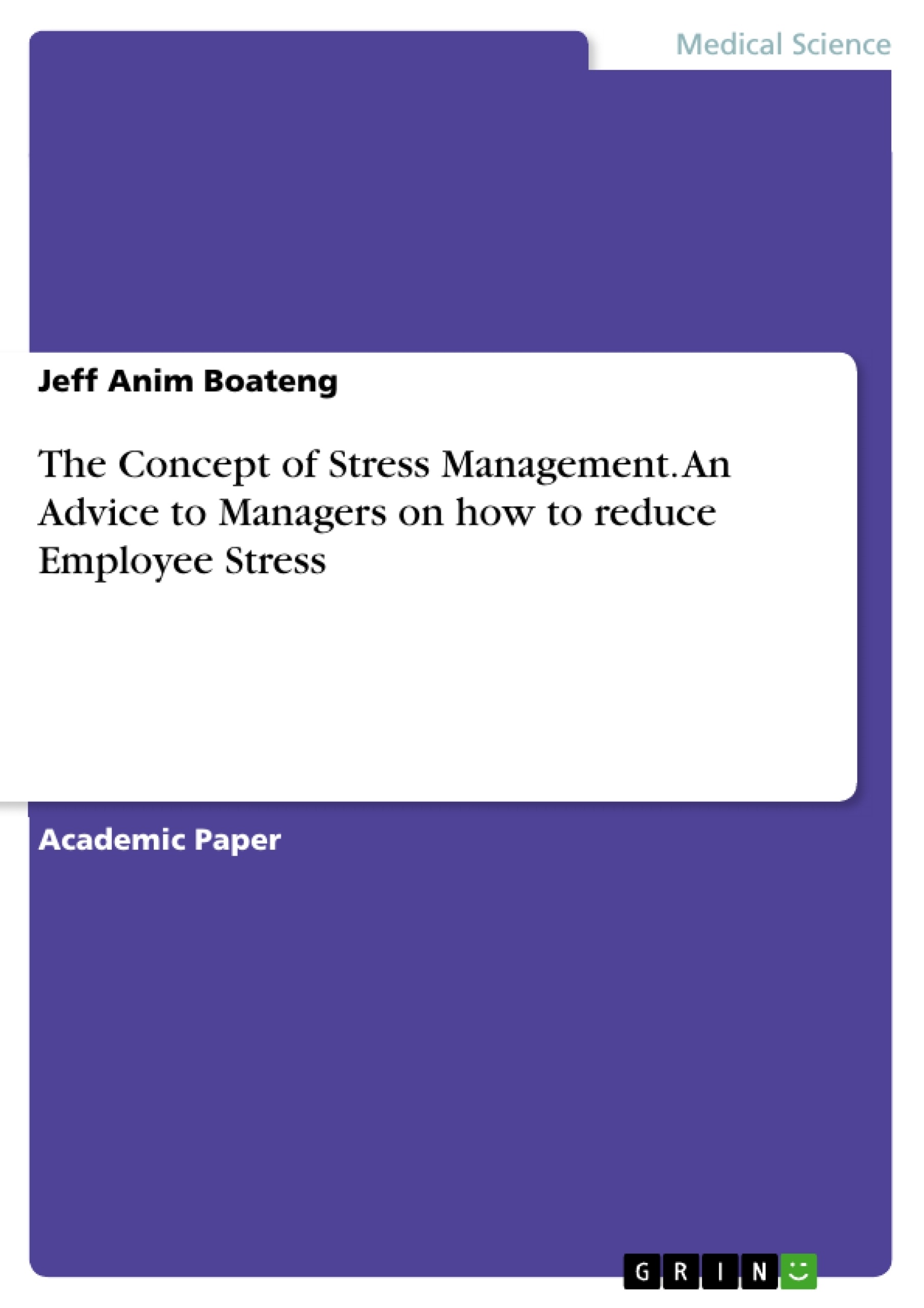This paper will hope to do a basic survey of hypothesis and examination into the different choices and approaches of stress-realted management which can be utilized to oversee employee stress and guarantee it does not arrive at an unreasonable level which could hurt organizational performance and results.Stress is a significant issue for current organizations and managers in the contemporary workplace. Not exclusively, stress-related ailments have an expense for associations regarding lost working hours and efficiency, however, more significant levels of stress have likewise been related with a lower level of fulfilment, more unfortunate quality help conveyance, and more elevated levels of turnover.
Inhaltsverzeichnis (Table of Contents)
- INTRODUCTION
- The Role of Line Managers
- Leadership Styles and Organisational Culture
- Employee Factors and Work-Life Balance
- The Psychological Contract
- Emotional Intelligence
- CONCLUSION
Zielsetzung und Themenschwerpunkte (Objectives and Key Themes)
This paper aims to provide an overview of research and theory on stress management in organizations, focusing on the role of managers in reducing employee stress. The paper explores different techniques and approaches to address stress, including the importance of line manager training, leadership styles, work-life balance, the psychological contract, and emotional intelligence.
- The role of line managers in managing stress
- The impact of leadership styles on organizational culture and stress levels
- The significance of work-life balance in employee well-being
- The importance of the psychological contract in fostering trust and reducing stress
- The potential role of emotional intelligence in managing stress effectively
Zusammenfassung der Kapitel (Chapter Summaries)
- INTRODUCTION: This section introduces the issue of stress in organizations and its impact on employee well-being and organizational performance. The paper highlights the crucial role of managers in stress management and outlines its primary objectives.
- The Role of Line Managers: This section emphasizes the significant role of line managers in addressing employee stress. It discusses the importance of training and equipping line managers with the necessary skills to support their team members and prevent stress escalation. The section also addresses the challenges faced by line managers in managing stress, including their own potential burnout.
- Leadership Styles and Organisational Culture: This section examines the influence of leadership styles on organizational culture and stress levels. It explores the potential pitfalls of traditional authoritative leadership styles and advocates for participative and transformational approaches that promote employee engagement and reduce stress.
- Employee Factors and Work-Life Balance: This section focuses on individual employee factors that contribute to stress, particularly in relation to work-life balance. It highlights the importance of creating a workplace environment that supports employees' well-being and minimizes excessive demands. The section also discusses the evolving nature of work and the impact of flexible work arrangements on employee expectations and stress levels.
- The Psychological Contract: This section explores the concept of the psychological contract, a tacit agreement between employees and their organizations regarding mutual expectations and obligations. It argues that a strong psychological contract fosters trust, motivation, and reduced stress, while breaches can lead to stress and negative consequences for the organization.
- Emotional Intelligence: This section examines the role of emotional intelligence in managing stress. It presents the argument that managers with higher levels of emotional intelligence are better equipped to understand and address employee needs, leading to improved stress management. However, the section also acknowledges the lack of strong empirical support for this claim.
Schlüsselwörter (Keywords)
Key terms and concepts explored in this paper include employee stress, stress management, organizational culture, leadership styles, line manager training, work-life balance, psychological contract, emotional intelligence, organizational performance, and employee well-being.
Frequently Asked Questions
How can managers help reduce employee stress?
Managers can reduce stress by adopting participative leadership styles, ensuring a good work-life balance, maintaining a strong psychological contract, and being trained to recognize early signs of burnout.
What is the "Psychological Contract" in the workplace?
It is an unwritten, tacit agreement between employees and the organization regarding mutual expectations. A breach of this contract often leads to decreased trust and increased stress levels.
Why is emotional intelligence important for managers?
Managers with high emotional intelligence are better at understanding and addressing the emotional needs of their team, which can lead to more effective stress management and higher employee satisfaction.
What are the organizational costs of high employee stress?
High stress levels result in lost working hours, decreased productivity, lower quality of service, and higher employee turnover rates.
How does leadership style affect organizational culture?
Authoritative styles can increase stress, while transformational and participative styles tend to promote engagement and a more supportive culture that mitigates stress.
- Arbeit zitieren
- Jeff Anim Boateng (Autor:in), 2020, The Concept of Stress Management. An Advice to Managers on how to reduce Employee Stress, München, GRIN Verlag, https://www.grin.com/document/963343



